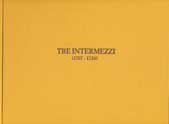Tre intermezzi (1707-1724)
Il decimo volume della collana «Drammaturgia musicale veneta» pubblica in anastatica le partiture degli intermezzi Le rovine di Troia (Dragontana e Policrone) di Antonio Lotti, Melissa contenta, di Lotti o di Francesco Gasparini, e Cuoco e Madama (La preziosa ridicola), la cui attribuzione ad Antonio Caldara resta incerta. I primi due titoli, rappresentati al teatro San Cassiano di Venezia negli anni 1707-1708, attestano gli inizi del genere, mentre l’intonazione viennese di Cuoco e Madama, risalente al 1724, ne testimonia il dinamismo e la fortuna. La preziosa ridicola conta infatti numerose riprese, a cominciare dalla première romana del 1712, incluso un allestimento a Venezia nel 1719, sicché il canovaccio originale si arricchisce ininterrottamente di varianti, talora significative sul piano dell’elaborazione delle forme e dei contenuti. Alla riproduzione – per le note musicali – della fonte manoscritta si affianca la trascrizione dei libretti secondo l’uso moderno, corredata di una Nota al testo che ne illustra i criteri generali assieme ad alcune soluzioni specifiche. Il saggio introduttivo sviluppa un commento ai testi e alle musiche, mettendo in luce gli aspetti relativi all’impiego consistente della parodia, del metateatro, della tradizione e dell’intertestualità, sino al rapporto strettissimo della Preziosa ridicola con il modello primario di Molière.
